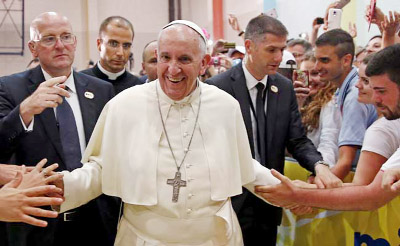
Reuters, Rome :
Representatives from the Vatican and China are expected to meet before the end of the month in Rome in an effort to finalise a deal on the ordination of bishops on the mainland, a move aimed at ending a longstanding dispute, according to Catholic Church sources familiar with the negotiations.
The Church sources also told Reuters that China is preparing to ordain at least two new bishops before the end of the year and these appointments would have the blessing of the Vatican. A person with ties to the leadership in Beijing confirmed that these ordinations would go ahead. For more than six decades, China’s ruling Communist Party has strongly opposed Rome’s right to ordain Chinese bishops in a bitter contest for authority over as many as 10 million Catholics on the mainland. Bishops, priests and lay Catholics loyal to Rome have faced persecution, which has sparked scepticism over the detente in some Catholic quarters.
In yet a further sign of progress, the Vatican has reached a decision to recognise at least four Chinese bishops who were appointed by Beijing without the consent of the pope and so are considered illegitimate by the Holy See, according to Catholic Church sources and others briefed on the talks. The decision follows a breakthrough meeting in mid-August in Beijing between the Vatican representatives to talks with China and several of these bishops.
For the Vatican, an agreement on the ordination of bishops is important because it would lessen the possibility of a formal split within the Catholic Church in China, which is divided between a community that follows the state-sanctioned Catholic hierarchy and an “underground” community that swears allegiance only to the pope in Rome. A deal on the ordination of bishops would help to unite these two communities, say Catholic Church and Vatican sources.
An agreement “would definitely remove the risk of a schism (within the Church in China), which for sixty years has been a potential threat,” said Elisa Giunipero, a researcher at the Catholic University of Milan who has studied the history of the Catholic Church in China for 20 years.
The latest developments are part of behind-the-scenes negotiations that have been driven by Pope Francis. A deal on the ordination of bishops would be a major leap forward in efforts to bridge a decades-old rift between the Chinese Communist Party and the Vatican.
Since becoming leader of the Catholic Church in March 2013, Francis has made it a priority to chart a new course in the Vatican’s contentious relationship with China. Reuters reported in July that Francis had sought to meet President Xi Jinping during a 2014 trip to New York in an effort to smooth the way to talks, and that a joint working group had been set up earlier this year in April to hammer out a deal on the bishops.
Representatives from the Vatican and China are expected to meet before the end of the month in Rome in an effort to finalise a deal on the ordination of bishops on the mainland, a move aimed at ending a longstanding dispute, according to Catholic Church sources familiar with the negotiations.
The Church sources also told Reuters that China is preparing to ordain at least two new bishops before the end of the year and these appointments would have the blessing of the Vatican. A person with ties to the leadership in Beijing confirmed that these ordinations would go ahead. For more than six decades, China’s ruling Communist Party has strongly opposed Rome’s right to ordain Chinese bishops in a bitter contest for authority over as many as 10 million Catholics on the mainland. Bishops, priests and lay Catholics loyal to Rome have faced persecution, which has sparked scepticism over the detente in some Catholic quarters.
In yet a further sign of progress, the Vatican has reached a decision to recognise at least four Chinese bishops who were appointed by Beijing without the consent of the pope and so are considered illegitimate by the Holy See, according to Catholic Church sources and others briefed on the talks. The decision follows a breakthrough meeting in mid-August in Beijing between the Vatican representatives to talks with China and several of these bishops.
For the Vatican, an agreement on the ordination of bishops is important because it would lessen the possibility of a formal split within the Catholic Church in China, which is divided between a community that follows the state-sanctioned Catholic hierarchy and an “underground” community that swears allegiance only to the pope in Rome. A deal on the ordination of bishops would help to unite these two communities, say Catholic Church and Vatican sources.
An agreement “would definitely remove the risk of a schism (within the Church in China), which for sixty years has been a potential threat,” said Elisa Giunipero, a researcher at the Catholic University of Milan who has studied the history of the Catholic Church in China for 20 years.
The latest developments are part of behind-the-scenes negotiations that have been driven by Pope Francis. A deal on the ordination of bishops would be a major leap forward in efforts to bridge a decades-old rift between the Chinese Communist Party and the Vatican.
Since becoming leader of the Catholic Church in March 2013, Francis has made it a priority to chart a new course in the Vatican’s contentious relationship with China. Reuters reported in July that Francis had sought to meet President Xi Jinping during a 2014 trip to New York in an effort to smooth the way to talks, and that a joint working group had been set up earlier this year in April to hammer out a deal on the bishops.

